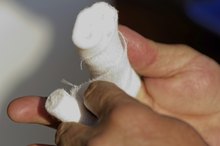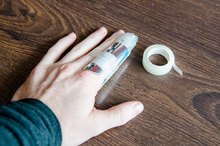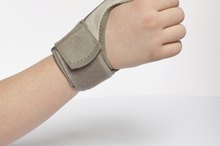Rehabilitation for a Broken Kneecap
The kneecap, or patella, is the bone that protects your knee joint. The kneecap is susceptible to many fractures and accounts for 1 percent of all broken bones. Rehabilitation for a broken kneecap can only begin after establishing the type of fracture and treatment options used. Never try to manage a broken patella without discussing your plans with a doctor. Physical therapy may need to be involved to teach you how to properly execute any exercises ordered.
If you are experiencing serious medical symptoms, seek emergency treatment immediately.
Fractures
A kneecap fracture can be displaced or nondisplaced. With displaced fractures, the bone is no longer aligned properly and gaps have formed between the bone. Nondisplaced fractures have good alignment and are considered stable. In some cases, the patella has comminuted fractures 1. These fractures are more severe and have several small shattered pieces. Treatment plans will depend on the type of fracture.
- A kneecap fracture can be displaced or nondisplaced.
Cause
Rehabilitation of a Fractured Heel Bone
Learn More
Most patella fractures result from forceful trauma to the frontal aspect of the knee. The resulting fracture is usually nondisplaced and managed easily. The patella can also be fractured by an indirect method, when the kneecap is broken due to contractions of the quadriceps muscle. This can occur if you attempt to stop from falling and the force of the contraction pulls the patella apart. These fractures are normally displaced and require more care.
- Most patella fractures result from forceful trauma to the frontal aspect of the knee.
- The patella can also be fractured by an indirect method, when the kneecap is broken due to contractions of the quadriceps muscle.
Immobilization
Most fractures will require immobilization as a precursor to the rehabilitation process. An immobilization device should be worn at all times and can be either a brace or cast. This time period will usually last between four to six weeks or until the fracture has healed. Some weight bearing and leg raising exercises can be done during this time. A doctor should check the status of your fracture and decide when you can begin further rehabilitation exercises.
- Most fractures will require immobilization as a precursor to the rehabilitation process.
- An immobilization device should be worn at all times and can be either a brace or cast.
Exercises
What Are the Treatments for a Broken Sternum?
Learn More
After the cast or brace has been removed, the doctor may have you begin exercises. These will help strengthen your quadriceps muscles and work on your range of motion. Care must be taken during these exercises to ensure that healing of your fracture does not become compromised. A physical therapist and doctor will be able to evaluate your needs and guide you to the best possible rehabilitation.
- After the cast or brace has been removed, the doctor may have you begin exercises.
- A physical therapist and doctor will be able to evaluate your needs and guide you to the best possible rehabilitation.
Related Articles
References
- American Academy of Orthopaedic Surgeons: Patellar Fractures
- MDGuidlines: Fracture Patella
- "Fracture Management for Primary Care"; M. Patrice Eiff, MD., et al.; 2003
- American Academy of Orthopaedic Surgeon. OrthoInfo. Patellar (kneecap) fractures. Updated January 2017.
- Melvin JS, Mehta S. Patellar Fractures in Adults. J Am Acad Orthop Surg. 2011;19(4):198-207.
Writer Bio
Matt Berry is a radiologic technologist who started writing professionally in 2007. He specializes in health and medical articles and has been published in "Radiologic Technology." Berry holds a Bachelor of Science in radiology technology from Mount Marty College and is credentialed in radiography and computed tomography with the American Registry of Radiologic Technologists.









